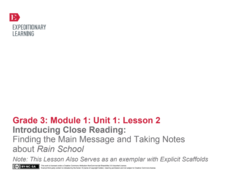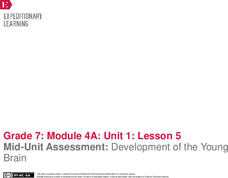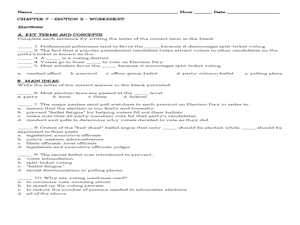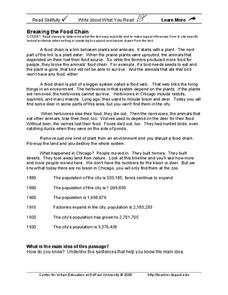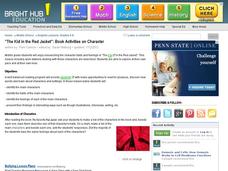EngageNY
Introducing Close Reading: Finding the Main Message and Taking Notes About Rain School
This second lesson in a larger unit is perfect for the beginning of the year because it explicitly teaches 3rd graders how to use close reading skills by identifying unfamiliar words, figuring out the gist, and defining important...
Curated OER
Political Cartoons
Students examine a variety of historical cartoons. They recognize a political cartoon and identify the main idea, symbolism, exaggeration and caricature in political cartoons. Students analyze a political cartoon by Benjamin Franklin.
Curated OER
Teaching Strategies For Main Idea Lessons
Main Idea Lesson Plans can help teachers make identifying the main idea of a passage a breeze.
Curated OER
Finding Main Ideas
In this reading worksheet, young scholars learn to identify the main idea in a newspaper article. Students read an article about police dogs and answer 2 questions. Then young scholars choose 3 newspaper articles on their own and...
Curated OER
Classifying Information About Main Idea
In this reading for understanding instructional activity, students underline information in a text that is important in identifying the main idea. This instructional activity provides good practice for students who usually have...
EngageNY
Mid-Unit Assessment: Development of the Young Brain
Scholars view a video clip about adolescent brain development and work with partners to identify the main idea and supporting details. Next, as part of the mid-unit assessment, pupils watch another clip from the video and complete a main...
Curated OER
The Emperor and the Kite
Fourth graders develop critical listening skills and answer four questions related to the story, THE EMPEROR AND THE KITE. They identify the main idea and recall a question that involves making a judgment.
Curated OER
Elections: Ch 7
Identify the main idea, key terms, and concepts with this activity on US Elections. There are 5 fill in the blank and 5 multiple choice questions for your class to answer.
Curated OER
Space Food
What do astronauts eat in outer space? Kids can read an informational passage to learn about space food. The passage includes prompts that have learners identify the main idea and key details, then write a paragraph summarizing the text....
Curated OER
Today’s Telephone
Does your class know the history behind today's telephone? They will after reading a very interesting one-page informational passage. They'll learn all about the way phones have progressed to the amazing devices they've become as they...
DePaul University
Settlement
Early settlers in the American Midwest experienced constant struggle. This reading passage describes for young learners the hardships of homesteaders as they journeyed west and sought to start a new life. When finished, students identify...
K12 Reader
Ben Franklin
Readers are asked to use the provided graphic organizer to list the main idea and supporting ideas in a passage about the inventions of Benjamin Franklin.
DePaul University
Learn about Fables
Expose young readers to a new genre of fiction with a short reading passage. After learning about fables, children identify the main idea and supporting details in preparation for writing a short summary. Read the text as a class,...
Curated OER
Reading Comprehension 2: Level 8
Need a quick assessment of your middle schoolers' reading comprehension skills? The four questions on this quiz ask readers to identify the likely source of the article, define words based on context, and identify the main idea of the...
DePaul University
Breaking the Food Chain
Throughout history, the growth of big cities has resulted in the destruction of ecosystems. In the case of Chicago, IL, a grassland that was once home to bison, deer, wolves, and foxes quickly became a booming city of over three million...
DePaul University
A Garden in Lawndale
We are all capable of changing the world for the better; all it takes is a spark. Read about a group of seventh grade students in Chicago, IL who took it upon themselves to improve their community by turning a vacant lot into a garden....
DePaul University
The Football Team
Playing team sports is about more than just scoring the most goals or winning the most games. Read this passage with your class and learn how athletes build character as members of a team. When finished, individuals identify the main...
K12 Reader
The Louisiana Purchase
Readers are asked to identify the main idea and two supporting ideas in a brief passage about the Louisiana Purchase.
Edmond Public Schools
SOAPSTone
Break an article down with a SOAPSTone chart. Class members determine the speaker, occasion, audience, purpose, subject, and tone. The chart includes a question for each of these elements, provides some clarifying text for each, and...
Curated OER
Elaborating the Main Idea, Using Supporting Details
A desk is used as a visual analogy to construct the main idea and supporting details in a story. The top of the desk is the main idea, and each of the four legs provides supporting details. The legs of the desk provide support for the...
Curated OER
Identifying Supporting Evidence from a Text - What is a Hero?
Pupils define hero and identify supporting evidence in a text. They complete a hero diagram worksheet and watch a video about a little boy from China who acts as a hero. Additionally, they complete the Ping Hero evidence worksheet...
Bright Hub Education
"The Kid in the Red Jacket": Book Activities
Learning stations aren't just for little ones; middle schoolers can have fun while learning about the main character in the book, The Kid in the Red Jacket. Outlined are three different activities that are completed as each small...
K12 Reader
The Apprentice System
Readers are asked to identify the central idea and two supporting details that develop this main idea in an article about the apprentice system popular in colonial America.
Curated OER
Main Idea and Supporting Details
Students identify main idea and supporting details from a short reading selection using a two-column note taking process. For this literacy lesson, students work in groups of three to four, then compare their papers with the other...


